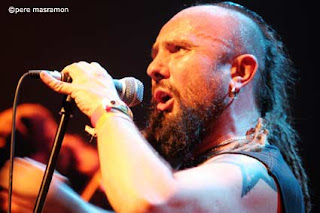Why is the internet always more interesting than schoolwork? Whole generations are going to be uneducated (at least in traditional school subjects) because of this.
Monthly Archives: January 2008
Saturday night I went with my rugged man to see a show with the band Kultur Shock. We actually saw them about two years ago, when they opened for Gogol Bordello. You probably haven’t heard of Kultur Shock, but you may very well have heard of Gogol Bordello. The guy in Everything is Illuminated, who isn’t Elijah Wood, is Eugene Hütz, Gogol Bordello’s lead singer.
While Gogol Bordello is gypsy punk with a Ukrainian/Brighton Beach flavor, Kultur Shock is Balkan gypsy punk. There is plenty of crashing guitar, but also keening, melting vocals that make you think of loneliness in the mountains, and shepherds, and campfires and men riding horses.
 I choose these images, perhaps, because the lead singer, Srdjan Yevdjevic a.k.a. Gino Banana, bears a great resemblance to Taras Bulba.
I choose these images, perhaps, because the lead singer, Srdjan Yevdjevic a.k.a. Gino Banana, bears a great resemblance to Taras Bulba.
My image of Taras Bulba, though, is greatly influenced by the 1962 Hollywood version, featuring Yul Brynner. (Bonus fact: Yul Brynner was actually of Russian origin, born in Vladivostok.) It just seems to me that if Taras Bulba had been a gypsy punk (though really Cossacks have nothing to do with gypsies and probably would be offended by the comparison), he would have been something like Srdjan Yevdjevic.
The first opening band was pretty awful, though they did have the sort of interesting gimmick of introducing every song with ‘Yeah, um, so this next one is called “Dick on a Bike”.’ We left and came back for the tail end of the second opening band, which was more decent. Turned out to be quite a few Balkans, Bulgarians, Russians, and general Eastern Europeans in the crowd, including several people we knew but hadn’t realized would be there. We got down on the dance floor when the real act began, and did a little moving.
There was a very tall guy in front of us for quite a while, with a wide shouldered suit jacket and a shaved head — he was reminiscent of Frankenstein. He had a petite little lady with him, who was perhaps not quite five feet tall, and the only time we could see over him was when he bent down to kiss her. At one point, he picked her up, so her arms were wrapped around his neck and her feet (in black, leather, pointy-toed boots) were hanging down between his legs. They reached about to his knees. A bit after that, thankfully, they left the dance floor, I presume to find a dark corner.
We spent quite a bit of time watching the audience, as well as the performers, and playing the same game we have played at the Gogol Bordello shows — Spot the Russians. I suppose it was more Spot the Eastern Europeans, but it’s really a pretty simple game.
All in all, a good night, if a late one. My only regret is that I can never remember to get ear plugs for these things, and my ears were ringing for a long time afterwards.
Water, besides being an incompressible 70% of my body, is an inescapably large part of my life. I grew up on the coast of Alaska, spent high school summers processing salmon, rowed for all four years of college, and worked for three summers as a kayak guide. Since moving to Seattle, I have been an interpretation volunteer at the Seattle Aquarium for more than two years, and have worked at The Center for Wooden Boats for nearly a year and a half.
Beginning with guiding, I became very interested in marine biology and ecology, and increasingly in climate change – not because green is the new black, or any such hyped media nonsense, but because the more I learn, the more I understand how it will affect the watery world of which I am so fond. My interest focuses specifically on the northern Pacific, where a continuity of habitat and species connects the Russian Far East with the Pacific Northwest and I have the language skills to fully access Russian scientific literature, as well as English-language publications.
I loved guiding because I was on the water in a place I loved, sharing how amazing everything was; every trip was a chance to see the area from a new perspective and pushed me to answer a new set of questions. As volunteer coordinator at a bustling non-profit, a portion of my time is still spent collecting information and forming it in an appropriate way to communicate to a thousand volunteers. Research and communication of information in a widely accessible way is the sort of work I would like to continue to do, but with a greater focus on marine resources.
I wish to study the marine environment of the northern Pacific as a resource drawn upon by many different groups – different countries, different groups within countries. The Pacific provides transport for industry, recreation for local users or visitors, food resources for native groups or for people in far-flung locations, who receive their salmon flash-frozen – and I have been directly or indirectly involved with nearly all of these ways, which will become increasingly historical as the oceanic cycles are disrupted by dead zones caused by algal blooms, over-fishing, by-catch and the unintended consequences of fish-farming depleting stocks, and acidification disrupting the livelihood of the ocean’s primary producers.
Marine resources have been an important part of my life and I want them to be there for future generations. To preserve marine resources, we need sensible policies. To write sensible policies, policy-makers need to be informed. To value and follow policy, the public needs to be informed. Information begins with scientists in the field, but does not always translate well from scientific journals to public knowledge, which gives rise to intermediary positions to translate and make science available and interesting to those who don’t know smelt from smolt, and don’t necessarily care, either.
I wish to gain broad understanding of the dynamics of the marine ecosystem and its interactions with various user groups, and then to use that understanding in public outreach and education, which could be either in the public or private sector, as a flack or as a science writer, or a job title which very clearly states “Outreach and Education Coordinator.” I believe this is a goal which can be best accomplished through the School of Marine Affairs.
Oh no!
The hiccups!
There’s somebody out there who owes me some money for this.